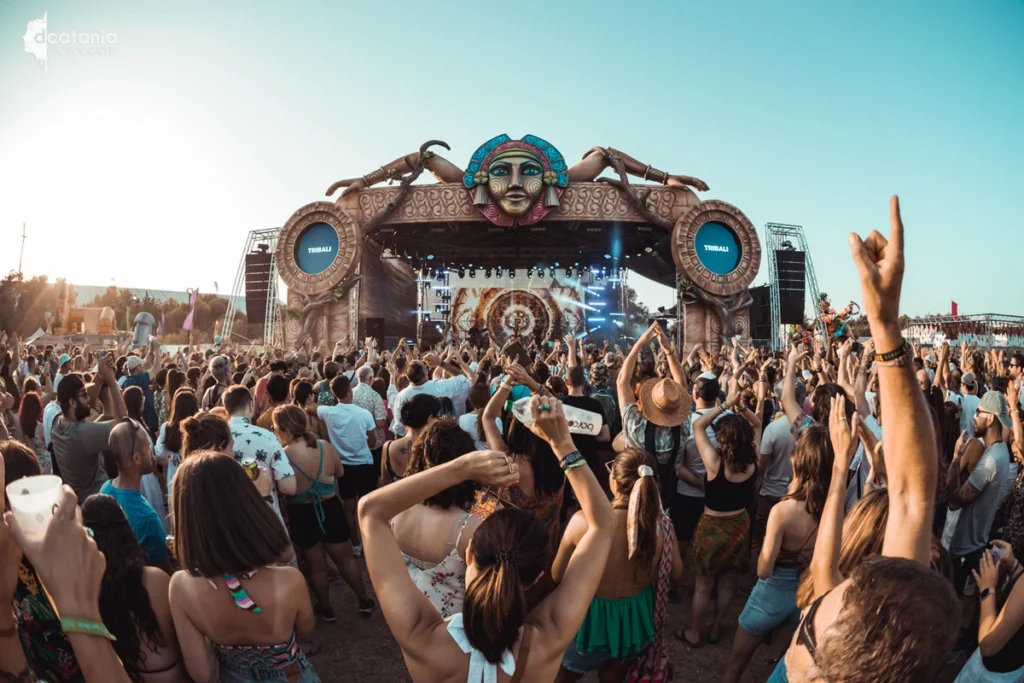How have virtual and hybrid music festivals changed the industry? This article explores the impact of these new formats on artists, fans, revenue, and the future of live music experiences.

Table of Content:
Introduction to virtual and hybrid music festivals
The music festival landscape has undergone a seismic shift over the past few years. Gone are the days when fans flocked to crowded fields and buzzing arenas, shoulder to shoulder with fellow enthusiasts. The emergence of virtual and hybrid music festivals has not only changed how we experience live performances but has also redefined what it means to connect through music.
As digital platforms continue to evolve and become increasingly sophisticated, virtual and hybrid approaches have unlocked a wealth of diverse experiences within the live entertainment industry. These innovative models are not just a temporary adaptation; they represent a fundamental shift in how music festivals operate and how fans engage with live music. This evolution has broadened access, offered new creative possibilities for artists, and reshaped the landscape of the music festival industry in profound and lasting ways. Artists and fans found new ways to connect through music. The music festival scene changed a lot.
The Rise of Virtual and Hybrid Festivals During Pandemic
The pandemic stopped in-person music festivals. This sudden change forced the music industry to get creative. Virtual festivals popped up, bringing concerts online. Hybrid events combined online and in-person experiences. These new formats changed how we enjoy live music.
- Pandemic-Driven Shift: The COVID-19 pandemic dramatically altered the landscape of music festivals, forcing widespread cancellations of in-person events and necessitating innovative solutions. Organizers and artists were compelled to adapt rapidly to the unprecedented circumstances.
- Virtual Festivals as a Lifeline: Virtual music festivals emerged as a crucial lifeline for the music industry and fans alike. Artists and promoters quickly pivoted to digital platforms, leveraging technology to bring live performances directly to audiences’ homes.
- Hybrid Events Gain Traction: Hybrid events, combining in-person experiences with online streaming components, also gained significant popularity during this period. These hybrid models offered a way to engage a broader audience beyond the physical festival grounds.
- Technology Enhances Connection: Innovative technologies, such as VR concerts and interactive apps, played a critical role in bridging the physical distance between artists and fans. These technologies transformed the festival experience from passive attendance to active participation, fostering a sense of community.
- New Revenue Streams Emerge: As artists embraced live streaming on various digital platforms, they unlocked new revenue streams. Virtual ticket sales and online merchandise offers, specifically tailored for viewers, provided alternative means of monetization and sustained the music ecosystem. This shift not only kept the spirit of music alive but also laid the groundwork for future innovations in the festival industry.

Advantages of virtual and hybrid festivals for the Industry
Virtual and hybrid music festivals offer some big advantages for the music industry. They open up new ways to reach fans, save money, and even learn more about what audiences like. These benefits are helping shape the future of live music
- Enhanced Accessibility: Virtual and hybrid festivals have revolutionized the music festival industry by offering unprecedented advantages, most notably increased accessibility. Fans from all corners of the globe can participate in these events without the constraints of travel or the limitations of physical ticketing.
- Cost-Effectiveness for Organizers: Cost-effectiveness is another significant advantage for organizers. They realize substantial savings on expenses typically tied to physical venues, security personnel, and logistical arrangements. These savings allow them to redirect resources toward enhancing the digital experience for online attendees.
- Innovation in Audience Engagement: These formats foster innovation in audience engagement through interactive features. Live chats, virtual meet-and-greets, and other interactive elements create deeper connections between artists and their fans, fostering a sense of community even in a digital space.
- Flexibility and Revenue Potential: Hybrid models offer a balanced approach, maintaining the excitement of a live, in-person experience for traditional festival-goers while also embracing technology to cater to those who prefer online participation. This flexibility attracts diverse audiences and maximizes revenue potential through combined ticket sales and digital offerings.
- Sustainability and Environmental Responsibility: Sustainability plays a crucial role in the rise of virtual and hybrid festivals. Digital platforms significantly reduce the carbon footprints associated with large-scale, in-person events, minimizing travel impacts and promoting eco-friendly practices. This shift aligns with growing concerns about environmental responsibility within the broader music festival landscape..
Challenges faced by virtual and hybrid festivals

- The Technology Barrier: Virtual and hybrid festivals, while opening new doors, present a unique set of challenges. A significant hurdle is the technology barrier. Not every potential attendee has consistent access to high-speed internet or the necessary advanced devices (smartphones, computers, VR headsets) required for optimal participation, creating a digital divide.
- Maintaining Audience Engagement: Audience engagement presents another key challenge. While some fans readily adapt and thrive in virtual environments, others miss the irreplaceable physical connection and shared energy of live, in-person events. Creating a truly immersive and captivating online experience that effectively captures and holds viewers’ attention requires innovative approaches to content creation and interaction.
- Monetization Strategies: Monetization poses a considerable challenge for organizers navigating this relatively new terrain. Finding effective and sustainable ways to generate revenue without compromising the user experience or alienating potential attendees is a complex balancing act. Traditional revenue models may not translate seamlessly to the digital realm.
- Competition in the Digital Space: The digital realm is highly competitive. Numerous virtual and hybrid festivals, along with other forms of online entertainment, vie for viewers’ attention. Standing out from the crowd requires unique and compelling offerings, combined with sophisticated and targeted marketing strategies.
- Sound Quality and Production Value: Ensuring consistent high sound quality and professional production value remains critical but can be complex when transitioning live performances from the physical stage to the digital screen. Technical difficulties, bandwidth limitations, and the challenges of capturing the energy of a live show all contribute to this complexity. Addressing these obstacles effectively will be crucial in shaping the future landscape of virtual and hybrid experiences.
Enhancing the Fan Experience
- Expanded Access to Performances: Virtual and hybrid music festivals have fundamentally changed the audience experience by offering unprecedented access to performances. These formats break down geographical barriers and ticket availability limitations, allowing fans to enjoy their favorite artists from the comfort of their homes, making concerts significantly more inclusive.
- Enhanced Engagement : The immersive nature of virtual and hybrid events significantly enhances audience engagement. Advanced technology facilitates interactive features such as live chats, polls, and seamless social media integration, creating a stronger sense of community among virtual attendees. Virtual reality concerts take this immersion even further, transporting fans into stunning and dynamic digital worlds.
- The Trade-off of Physical Presence: While online experiences offer unparalleled convenience and accessibility, there is an acknowledged trade-off. Some fans inevitably miss the raw energy and palpable excitement of live crowds. The physical presence at a traditional music festival possesses an irreplaceable charm that contributes to the creation of lasting memories.
- Bridging the Gap Through Innovation: Despite this trade-off, innovative streaming platforms are constantly evolving, and future virtual experiences are poised to bridge the gap between the physical and digital. These technological advancements promise to capture more of the energy and community feeling of live events.
- Unprecedented Changes in Audience Connection: This continuous evolution in virtual and hybrid music festivals is fundamentally changing how audiences connect with music. These new formats offer alternative and often more accessible ways for people to experience and engage with live performances, shaping the future of music consumption in unprecedented ways.
The Future of Music Festivals: A Hybrid Approach?

- Global Reach for Artists: The future of virtual and hybrid music festivals appears bright, fueled by continuous technological advancements. Artists are increasingly leveraging digital platforms, enabling them to connect with and reach a global audience on an unprecedented scale.
- Immersive Experiences Through Technology: As innovations in music festival technology emerge, the online experience will become even more immersive and engaging. Virtual reality concerts, for example, could offer fans the sensation of being front-row at a live performance from the comfort of their own homes.
- Seamless Integration of Physical and Digital: Hybrid event strategies will likely become more sophisticated, seamlessly blending the physical and online components of the festival experience. This integration will enhance accessibility, ensuring that a wider range of individuals can participate, regardless of their geographical location or financial limitations.
- Enhanced Audience Engagement: Audience engagement in virtual festivals is poised to grow significantly with the development of more interactive features. Live Q&A sessions with artists, real-time polls, and other interactive elements will create a stronger sense of community among virtual attendees.
Conclusion: The Evolving Landscape of Live Music
Virtual and hybrid music festivals have revolutionized the industry, expanding global reach and audience engagement. Technological advancements have created immersive online experiences, breaking down barriers to access. Sustainability has become a key driver, minimizing environmental impact. Hybrid models point to a future of combined physical and digital participation. These adaptations are crucial for the music industry’s survival and growth, forever changing how live performances are experienced.


